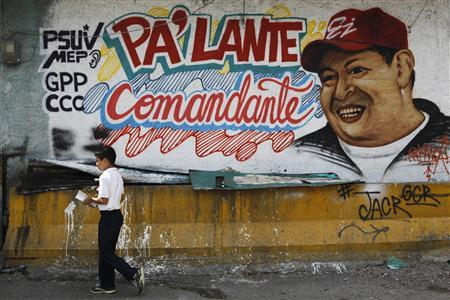Chavez Getting 'Alternative' Treatment; Money Devalued

Venezuelan President Hugo Chavez is undergoing "complex" alternative treatments more than two months after his cancer surgery in Cuba, his vice president said Wednesday.
The 58-year-old leftist leader has not been seen in public since he went to Havana for the operation on Dec. 11, his fourth surgery for cancer in 18 months.
Vice President Nicolas Maduro did not give details of the alternative treatments the president was receiving, Reuters reported. Chavez has never revealed what type of cancer he is suffering from, and critics accuse the government of excessive secrecy over his condition.
"Today our commander is undergoing alternative treatments ... they are complex and difficult treatments that must, at some point, end the cycle of his illness," Maduro said in comments on state TV.
The government, which denies covering up Chavez's condition, says he has completed a difficult post-operative period and has started a "new phase" of his recuperation, giving no details.
Chavez's lengthy absence hasn't stopped his government from making some significant changes, CNN reports.
The latest -- devaluing the country's currency -- started Wednesday. It's a significant move that stands to affect global businesses and everyday Venezuelans.
Long lines of customers packed Venezuelan electronics and appliance stores after Friday's announcement of plans to devalue the bolivar by nearly a third.
"We are following instructions from President Hugo Chavez, who demanded more efficiency in the fight against inflation," Finance Minister Jorge Giordani told reporters when he made the announcement Friday, holding up a decree that he said came from Chavez. "Here is the president's signature, in case you would like to recognize it or if you still have doubts."
The new exchange rate of 6.3 bolivars to 1 dollar goes into effect Wednesday. It's the fifth time Venezuela has devalued its currency in the past decade.
Experts from within the leftist government as well as from Wall Street all saw the devaluation as necessary to correct economic distortions. Yet it is widely unpopular, and many Venezuelans fear they will pay for it with higher local prices.
There has been unusual criticism even from some within Chavista circles. And opposition parties have mockingly accused the government for implementing its own version of an old-style, right-wing International Monetary Fund economic "package".
Giordani rejected those arguments, Reuters reported.
"If it's a package, where's the privatization? Where's the worsening of labor laws? Where's the interference of the IMF? That's absurd," Giordani said.
"They're questioning our use of the word adjustment. They are real cretins! If someone is 100 kg overweight, he'd better adjust or he'll have a stroke or heart attack," he added in an interview with state-run newspaper Caracas City.
Despite 14 years of Chavez's socialist rule, Venezuela remains a highly materialistic, Westernized society. Those who can, try to save money in U.S. dollars, though 10 years of currency controls have made that difficult.
"There's a culture, a popular fantasy over the dollar," Giordani said, noting that no foreign currency was needed to benefit from government social programs offering free education and schooling, or subsidized housing.
"You don't even need to have seen a dollar in your life, but ... we all have this insatiability for the dollar, like a dollarized nymphomania. It's a sickness."
© Copyright IBTimes 2025. All rights reserved.





















